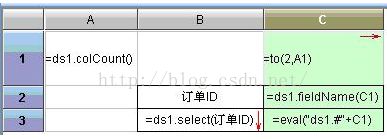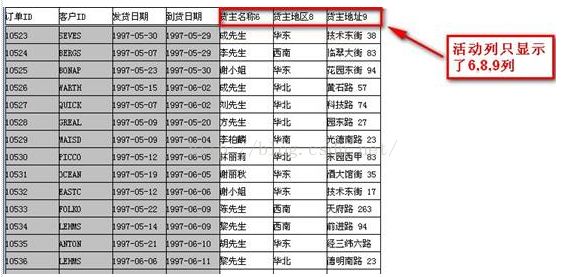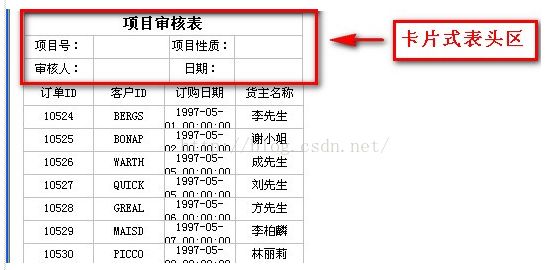| 开发报表期间,有时会遇到这样的需求,在列表类的报表中想动态的显示某些字段。 本文就来讨论一下如何实现上面的需求,大致可以分为两种方法,一是在设计报表时把所有的列都设置好,用隐藏列属性控制列的显示或者隐藏,二是用API的方式动态的增加列,用来显示需要显示的字段。 下面分别说一下两种方式的实现方法 一.可以使用润乾的datasetName.field( stringExp )及datasetName.fieldName( intExp )实现动态列报表 1、 使用eval(),通过动态解析并计算表达式,实现列的扩展;
2、 使用ds.colCount(),获得数据集的列数;
3、 使用ds.fieldName(),根据列号取数据集的列名。
使用这三个函数就能实现客户的需求了,具体做法如下:
我们使用demo中的“订单”这张表为例,SQL语法为:SELECT * FROM 订单,表中的单元格写法如图:

最终调整单元格大小后,预览如下图:

二.在设计报表模板时,把所有的字段都设置好,用隐藏列属性根据条件控制列的显示或者隐藏。 如下报表 
报表中含有10列,显示了10个字段,前4列是常规列,后6列是活动列。设置一个参数showColID,参数类型为字符串组,此参数用来接收需要显示列的列号,在隐藏列属性里写表达式“if(str(col()) in (@showColID),false,true)”。这个表达式只设置在5,6,7,8,9,10列的第一行中单元格的隐藏列属性就可以了,不用给每一列的所有单元格设置,那样会影响效率。 参数showColID的值为“6,8,9”,显示效果如下 
此方法的优点:只在报表中设置,不用写程序就可以实现,实现方法比较简单容易。数据量大时可以启用缓存。 缺点:活动列中的字段默认情况下在数据集中要全部查询出来。只适用于上图中网格式报表,如果报表中含有卡片式表头,或者是行式报表,用上面方法就不能实现了。 二.API方法 如果是行式报表,上面的方法就不能实现,因为行式报表不支持隐藏列;或者是含有卡片式表头的普通报表,用上面的方法也不能实现,隐藏行后表头的内容有可能也被隐藏了。 如下面报表 
实现原理: 先说一下含有卡片式表头的普通报表如何动态显示某些列呢?卡片式表头做在一个子表里,用嵌入式方式引用子报表,用API提供的方法增加列,用来显示需要显示的字段,这样数据区的宽度会增加,而卡片式表头区的宽度并没有增加,把数据区增加的宽度平均分配给卡片式表头区的每一列,这样就可以保持表头区和数据区宽度相同。 实现方法: 首先设计一个报表模板,只设计常规列就可以。 
动态显示的列名、字段名、字段类型通过json方式传递给jsp,如下"{\"colAddField\" : [{\"dataSetName\" : \"ds1\",\"dataType\" : str,\"colAndField\" : \"货主邮政编码,货主邮政编码\"}, {\"dataSetName\" : \"ds1\",\"dataType\" : number, \"colAndField\" : \"运货费,运货费\"},{\"dataSetName\":\"ds1\" ,\"dataType\" : str, \"colAndField\":\"雇员ID,雇员ID\"}]}" 写个报表处理类,在类中用上面说的原理来实现增加列,如下 public static void setReportDefine(ReportDefine rd,String colAndFieldStr) throwsJSONException{ if(colAndFieldStr.length()>0){ //设置报表单位为毫米 rd.setUnit(ReportDefine.UNIT_MM); //得到A1单元格的颜色值 CellLocation locationA1 = CellLocation.parse("A1"); INormalCell cellA1 = rd.getCell(locationA1.getRow(), (short)locationA1.getCol()); int colorValue = cellA1.getBBColor(); int startRow = 2; //数据区开始行 float numberColWidth = 25; //数值型数据列宽 float strColWidth = 30; //字符串型数据列宽 String numberShowFormat = "¥#0.00"; //数值型数据显示格式 float addColTotalWidth = 0; //所有增加列宽的总和 JSONObject jsonObj = null;//Json对象 JSONArray jsonArr = null; try { jsonObj = new JSONObject(colAndFieldStr); jsonArr = jsonObj.getJSONArray("colAddField"); } catch (JSONException e) { e = new JSONException("传入的JSON数据格式错误"); } int colNum = rd.getColCount(); for(int i=0; i JSONObject tempObj = null; tempObj = jsonArr.getJSONObject(i); String colType = tempObj.get("dataType").toString(); //列类型 //增加一列 rd.addCol(); INormalCell descCell = rd.getCell(startRow, (short)(colNum + i + 1)); IByteMap colWidthByteMap = new ByteMap(); colWidthByteMap.put(IColCell.WIDTH, numberColWidth); String tmpStr = tempObj.get("colAndField").toString(); descCell.setValue(tmpStr.substring(0, tmpStr.indexOf(","))); IByteMap exp2 = new ByteMap(); exp2.put(INormalCell.VALUE,tempObj.get("dataSetName") + "." + tmpStr.substring(tmpStr.indexOf(",")+1, tmpStr.length())); INormalCell fieldCell = rd.getCell(startRow + 1, (short)(colNum + i + 1)); fieldCell.setExpMap(exp2); //设置列宽和单元格显示表达式 IColCell newCol = rd.getColCell((short)(colNum + 1 + i)); if("number".equals(colType)){ newCol.setColWidth(numberColWidth); fieldCell.setFormat(numberShowFormat); addColTotalWidth = addColTotalWidth + numberColWidth; }else if("str".equals(colType)){ newCol.setColWidth(strColWidth); addColTotalWidth = addColTotalWidth + strColWidth; } //给新增加的列设置边框,并且设置内容水平对齐方式为居中 descCell.setHAlign(INormalCell.HALIGN_CENTER); descCell.setLBStyle(INormalCell.LINE_SOLID); //左边框 descCell.setLBColor(colorValue); descCell.setTBStyle(INormalCell.LINE_SOLID); //上边框 descCell.setTBColor(colorValue); descCell.setBBStyle(INormalCell.LINE_SOLID); //下边框 descCell.setBBColor(colorValue); descCell.setRBStyle(INormalCell.LINE_SOLID); //右边框 descCell.setRBColor(colorValue); fieldCell.setHAlign(INormalCell.HALIGN_CENTER); fieldCell.setLBStyle(INormalCell.LINE_SOLID); //左边框 fieldCell.setLBColor(colorValue); fieldCell.setTBStyle(INormalCell.LINE_SOLID); //上边框 fieldCell.setTBColor(colorValue); fieldCell.setBBStyle(INormalCell.LINE_SOLID); //下边框 fieldCell.setBBColor(colorValue); fieldCell.setRBStyle(INormalCell.LINE_SOLID); //右边框 fieldCell.setRBColor(colorValue); } //处理子报表,给子报表平均增加列宽 SubReportMetaData subReportMd = rd.getSubReportMetaData(); int subReportNum = subReportMd.getSubReportCount(); Context cxt = Context.getInitCtx(); ServletContext application = cxt.getApplication(); //得到存放报表的文件路径 String reportPath = application.getRealPath(Context.getMainDir()); if(subReportNum!=0){ Area area = rd.getCell(1, (short)1).getMergedArea(); area.setEndCol(rd.getColCount()); SubReportConfig subReportConfig = subReportMd.getSubReportConfig(0); String reportUrl = subReportConfig.getURL(); ReportDefine rdI = null; try { //读取子报表 rdI = (ReportDefine) ReportUtils.read(reportPath + "/" + reportUrl); } catch (Exception e) { e.printStackTrace(); } //设置报表单位为毫米 rdI.setUnit(ReportDefine.UNIT_MM); //给子报表平均增加列宽 int subRdColNum = rdI.getColCount(); for(int j=1; j<=subRdColNum; j++){ IColCell tempCol = rdI.getColCell((short)j); float tempColWidth = tempCol.getColWidth(); tempCol.setColWidth(addColTotalWidth/subRdColNum + tempColWidth); } subReportConfig.setURLType(SubReportConfig.TYPE_CUSTOM); subReportConfig.setSubReportDefine(rdI); |